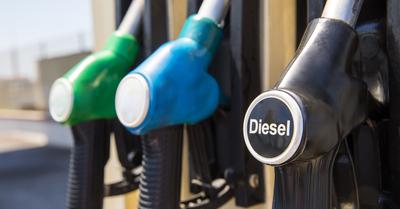Diesel fuel is an essential part of many industries, powering vehicles, and machinery. But exactly how long does diesel fuel last?
Diesel fuel lasts 18-24 months in your vehicle’s fuel tank and 6-12 months on a shelf before being used. The shelf-life can change quite a bit depending on the storage temperature and location. Keep the fuel stored at around 70 degrees Fahrenheit and use fuel stabilizers for longer shelf life.
We’ve gathered all the information needed to explain the shelf-life of diesel. Diesel can sometimes last longer if stored correctly and treated with additives. We must be aware of fuel quality and take precautions in storing it.
Key Takeaways
- Diesel fuel lasts 18-24 months in your vehicle’s fuel tank if your car avoids extreme temperatures.
- Diesel fuel lasts for only 6-12 months on a shelf.
- You can use fuel stabilizers to extend the shelf life of diesel fuel.
This article may contain affiliate links where we earn a commission from qualifying purchases.
How Long Does Diesel Fuel Last? A Quick and Informative Guide
In the world of fuels, diesel has a reputation for being extraordinarily resilient. Diesel engines are known for their longevity, and diesel fuel has a longer shelf life than its gasoline counterpart.
But just how long does diesel fuel last? And what factors can influence its shelf life? Let’s review how long fuel lasts in a vehicle and on the shelf below.
How Long Does Diesel Last In A Tank?
On average, diesel fuel can be stored in the fuel tank of your vehicle for 18-24 months, but this duration can be extended by maintaining ideal storage conditions. This is assuming you are using traditional on-road diesel with 3-5% biodiesel content.
One critical factor is keeping the fuel cool, ideally at around 70 degrees Fahrenheit. Treating the fuel with biocides and stabilizers, as well as adhering to proper maintenance procedures, can also help extend its lifespan.
In addition, the quality of the diesel fuel plays a role in how long it lasts in a tank. Lower-quality fuels can break down more quickly, leading to engine deposits and reduced effectiveness.
How Long Does Diesel Last On The Shelf?
Diesel fuel shelf life can vary depending on the storage conditions and ambient temperature. Under most circumstances, diesel fuel can last for 6-12 months or longer when stored at an ambient temperature of around 20°C (68°F).
So if you plan to store diesel fuel at home, use fuel storage tanks for longer shelf life. Otherwise, diesel fuel lasts only 6-12 months when kept in ideal conditions. The shelf life decreases when stored at an ambient temperature higher than 30°C (86°F).
To maximize the shelf life of diesel fuel, it's essential to store it in a cool, dark environment and regularly test the quality after 12 months to ensure it remains in good condition. By taking these precautions, we can help maintain the integrity of our diesel fuel, ensuring it is ready for use when needed.
Does Diesel Fuel Go Bad?
Diesel fuels can go bad over time. It can deteriorate and break down due to several factors, such as exposure to air, water, microbes, temperature fluctuations, and contaminants.
For example, when diesel fuel is exposed to air, it can oxidize. This can lead to the creation of fine sediments and gum, which can clog fuel filters and injectors, impairing the performance of your engine.
Using petroleum fuel stabilizers and biocides and maintaining optimal storage conditions (cool, dry, stable temperature, and limited exposure to air) can help extend the shelf life of diesel fuel. Microbial growth can also cause stored diesel to go bad, clogging filters in your car.
How Should You Store Diesel Fuel For Optimal Shelf-Life?
Keep Fuel Dry
Keeping fresh fuel dry is essential to preserving its quality because moisture promotes bacterial and fungal growth, which can lead to fuel degradation. To minimize moisture, we recommend regularly checking and maintaining storage tanks for leaks and condensation.
Also, using fuel stabilizers and biocides can help manage moisture levels. Typically, temperature changes will also cause stored diesel fuel to get wet and shorten the storage life. An underground tank can do this well.
Store At Cool Temperatures
Storing diesel fuel at cool temperatures (below 70 degrees Fahrenheit consistently) prolongs its shelf-life by minimizing oxidation and evaporation. The temperature can directly impact how long diesel fuel will last in storage.
Under ideal conditions, stored fuel can last up to a year. Keep your storage tank in a well-ventilated, shaded area to avoid temperature fluctuations caused by direct sunlight.
Add Fuel Stabilizer & Biocides
Fuel stabilizers and biocides protect diesel fuel from degradation during long-term storage. Stabilizers slow down fuel oxidation, while biocides prevent bacterial and fungal growth. This means no unexpected chemical reaction to break down the fuel.
To extend diesel fuel's life past twelve months, even under the best conditions, it needs treatment with fuel stabilizers and biocides. Make sure to follow the manufacturer's recommendations for proper dosing and application.
How Can You Tell If Diesel Fuel Is Bad?
Gelling
In colder temperatures, diesel fuel can begin to gel, causing it to become thicker and more difficult for your engine to use.
If your fuel has become thicker and appears to be gelling, it's time to address the situation by using fuel additives or investing in proper storage to prevent further gelling.
Color Changes
As diesel fuel ages, it can undergo color changes. Fresh diesel is usually a clear, straw-like color. If your diesel has become darker or murky, it may indicate that the fuel has gone bad.
While a darker color doesn't necessarily mean the diesel is bad, it can indicate that the fuel has aged. Additionally, if there's a cloudy appearance or if you notice particles or sediment in the fuel, this could mean that there is water contamination or microbial growth, both of which indicate bad diesel fuel.
Fuel Filter Clogging
Another sign of bad diesel fuel is frequent clogging of the fuel filter. The presence of water, contaminants, or microorganisms in diesel fuel can lead to filter clogs.
This reduces the overall efficiency of your engine. To prevent this issue, it's essential to maintain your fuel filter and inspect it for any signs of clogging.
Sour Or Vinegar Smell
Lastly, a sour or vinegar-like odor can indicate that your diesel fuel has gone bad. This unpleasant smell is a result of chemical reactions occurring in the fuel.
This can lead to diminished performance and possible engine damage. If you detect such an odor, it's time to replace the fuel. If the fuel smells sour or like rotten eggs, this could be due to microbial contamination, which can clog filters.
Can You Prolong The Shelf Life Of Diesel Fuel?
Yes, we can definitely take measures to prolong the shelf life of diesel fuel. One of the first things to consider is maintaining the fuel at an optimal temperature.
Ideally, it should be kept cool at around 70 degrees Fahrenheit. Temperature consistency helps prevent fuel degradation and increases its lifespan.
Another critical step is treating the diesel with biocides and stabilizers. These additives help inhibit the growth of microbes and maintain fuel quality over time. Using proper fuel treatments can make it last longer and prevent its degradation.
Regular maintenance and proper storage are also important factors. Ensuring that fuel storage tanks are clean, free from water and contaminants, and well-ventilated can go a long way in increasing the longevity of stored diesel.









